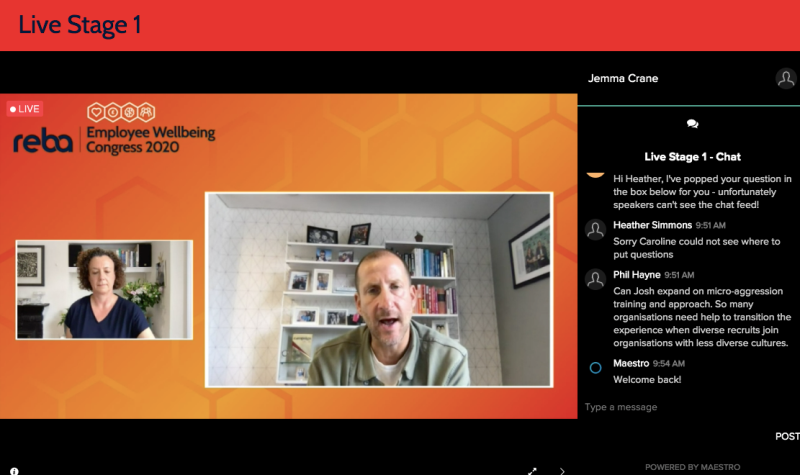Kindness and compassion: the rise of human workplaces
 Josh Krichefski, CEO for EMEA and global COO at MediaCom, was yesterday morning's keynote interviewee at REBA's Employee Wellbeing Congress.
Josh Krichefski, CEO for EMEA and global COO at MediaCom, was yesterday morning's keynote interviewee at REBA's Employee Wellbeing Congress.
In the second day of REBA’s Employee Wellbeing Congress, we saw nearly 400 delegates log-on to participate in discussion groups, watch keynote speakers and learn about the future of wellbeing practice.
Kindness and compassion
In recent months we have seen how organisations have become more agile and flexible in their approach to work. This has naturally created workplaces where empathy, kindness and compassion has shown through. There have been concerns that as things begin to return to a sense of normality, this understanding would be lost.
In our opening keynote session, Josh Krichefski, CEO for EMEA and global COO at MediaCom, outlined how his people-first culture not only supports the concept of a more human workplace, but also pays dividends in business outcomes. His passion for creating workplaces that have a culture centred on employee wellbeing inspired many of our delegates, who were keen to take his message back to their own senior team.
“Businesses that will succeed are those that are comfortable with uncertainty. But humans don’t like change – we need to help staff and lead by example,” said Krichefski.
Financial wellbeing
Yesterday’s Congress had a strong focus on financial wellbeing, with case study sessions, interviews and a keynote speaker all focusing on the issue. A key point to come from all of the sessions was the need for a holistic approach, and in particular, one that focused on the needs of younger employees.
Accessibility and choice were key messages to come through, as well as the need for education. Young Money blog writer Iona Bain highlighted the plight of younger employees, many of whom are now experiencing financial hardship because of the pandemic. She showed that many of them may now be falling into debt which could blight their financial lives for years to come.
Her message to employers was to ensure that interventions are in place now to support them in their financial goals – be it trying to clear debt or save for their future – to ensure that they have stability in their lives to enable them to deliver at work.
Evidence and data
Our final panel of the day looked at the role of clinicians in developing wellbeing strategies. They argued that specialists can add a great deal of value to the organisation and they should be used to understand what interventions will make a difference.
They urged employers to seek evidence when assessing health and wellbeing suppliers. And highlighted the need to hold suppliers to account to ensure they deliver interventions that fit with the organisation and achieve their stated outcomes.
Undoubtedly, central to this is understanding the requirements of the workforce. Data is critical to being able to deliver the best benefits and support services for employees. Without this knowledge and clinical understanding it is very difficult to go down the right wellbeing path for your workforce and to realise the value of the investment.
More to come
Yesterday was the second of REBA’s four-day Employee Wellbeing Congress, which will continue on the 23rd and 30th September. We’ll be expanding on many of these themes and exploring other crucial aspects of workplace wellbeing across the month.
Next week will be future gazing into the world of work. Take a look at next week’s agenda and register here to see the great range of speakers, case studies and networking opportunities.
The author is Dawn Lewis, content editor at REBA.






